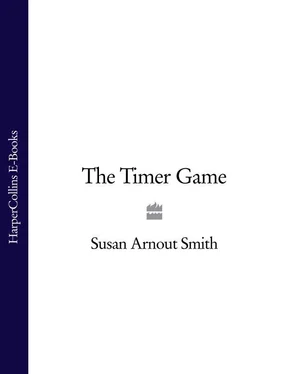‘I was the forensic biologist Eddie Loud tried to kill.’ It hung there. So I killed him .
Crumwald took off his glasses and wiped them on his shirt. ‘Come in. Close the door.’
Client photos covered a large bulletin board in his office: grinning McDonald’s workers, a city employee stabbing trash at Shelter Island, a singing telegram dressed as a hot dog.
‘Where’s Eddie? I want to see his face.’
Crumwald pointed him out. Eddie Loud stood stiffly in front of the sparkling taco van, hair combed, pride and anxiety blazing across his face. He was wearing a pair of blue pants and a pressed shirt. He was gripping a bag of tacos, but gently, it appeared, so they wouldn’t crush.
‘Believe it or not, he was a kind man. Not violent. His poor parents.’
Grace shot him a measured look. ‘He killed a DEA chemist, a detective sergeant, and a uniformed police officer yesterday. Good men. And he did this to me.’ She raked down her turtleneck so he could see the purple mark left when Eddie had grabbed her.
Crumwald blinked. ‘I’m sorry. Please. Have a seat.’
She took one across from the desk, and he sat heavily in his chair and placed his hands flat on the desk as if to compose himself.
‘I was hired on faith, understand? To cobble together a program assisting those the world has no interest in helping. And now –’
‘He was in a halfway house. And this program for work. Was he in rehab?’
‘I can’t answer that. That’s confidential.’
‘He’d dead, Mr. Crumwald. It’s going to come out.’
‘When you … saw him. Did it look like Eddie was on some kind of drug?’
‘He was amped like a light show. Cranked so high his brain was frying. I’d bet money.’
The air went out of him and Crumwald slumped in his chair. He had a squishball stress reliever next to a photo of a placidly smiling woman. He picked up the ball and squeezed. He looked defeated.
‘That’s so unbelievable. He knew if he tried that he’d be gone. He really wanted to stay.’
‘Did Eddie ever bring up anybody called the Spikeman?’
Crumwald shook his head. ‘But I’m not the one he talked to. When he did talk. He didn’t do too much talking when he was medded properly.’ Crumwald looked up, still back on what she’d said about drugs. ‘He could have just stopped taking his meds.’
‘I don’t know what was wrong with him, Mr. Crumwald, but if not taking meds is enough to get him to hack up three men with a butcher knife and start on me, then sure, stick with that.’
‘They feed off each other energywise. Yesterday he was agitated in group and later, another client fell apart. Not as spectacularly but … big mess we’re still cleaning up.’
Jazz Studio.
‘Did Eddie Loud say anything in group that would have alerted you?’
‘You mean, so I could have stopped it?’ Crumwald sounded defensive and aggrieved and he squished the ball harder. It made a squelching sound like a trapped mouse.
‘No, just –’
‘Just what, Ms. Descanso? I run this place on a shoestring and a prayer, and if I stopped every client from going out that door who thought sometimes he was God or the next Bill Gates – or Bill Gates himself – I’d never have confidence to send any of them out. They’re trying. Beset by demons, but trying. They haven’t given up. Where are you going with this?’
‘Is there any reason Eddie should have known who I was?’
‘None that I know of.’
‘Because he did. Right before he tried to kill me, he said my name and warned me about somebody he called the Spikeman.’ She couldn’t keep the tremor out of her voice.
Crumwald looked genuinely shocked. ‘He said your name? I don’t understand.’
‘That makes two of us. If you have anything, anything at all, I need to know it now.’
Crumwald stood heavily and looked out the window. ‘Anything else needs to come from higher up the food chain, if you know what I mean. Warren Pendrell is the head of this place.’
He said the name as if that should scare her.
‘Warren Pendrell,’ he repeated.
Talking to Warren Pendrell was the last thing she wanted. It’s what she’d been trying to avoid by going to Crumwald first, and already she could feel the familiar constriction in her throat.
She walked out of the outpatient facility and got in her car, driving across the parking lots that connected the research and hospital sides and reparking so she could make a speedy getaway afterward. The dignity of her exit would be lost if she had to tramp across the gravel and succulent beds back the way she’d come. Not that he’d be watching.
But maybe someone was, out of the blank-faced windows in the high granite building, and that was troubling. A faint wire mesh covered a set of windows on the second floor, and Grace snatched another glance, disquieted. The wire was new, she was certain, and she wondered if that’s where she’d find Jazz. The building rose like a granite monolith under a vivid blue sky with a faint tracing of clouds. A perfect San Diego day, covering what?
He’s coming for you … He’s the Spikeman .
She locked up and entered the building under an imposing sign etched in granite: CENTER FOR BIOCHIMERA.
Next to the sliding glass doors was a smaller sign in black letters: WARNING! THIS IS A LATEX-FREE SITE. ALL LATEX PRODUCTS STRICTLY FORBIDDEN!
Grace scanned the lobby. A young woman sat reading at the information kiosk in the middle of the room. A small coffee and pastry area lay to the left, most of the tables occupied by interns and nurses, none she recognized. On the walls hung pictures of the groundbreaking, Nobel laureates who did research at the Center, and an unseemly number of photos featuring Warren as the beaming centerpiece, his shock of white hair glowing along with his teeth.
The V of the building opened into floor-to-ceiling windows, revealing the view. Here the ocean was a churning presence, a gray and blue highway carrying Navy traffic and fishing trawlers out to sea. The skyline of La Jolla glinted in the bright sun, and far to the south, Mexico’s Coronado Islands rose like the purple humps of a prehistoric sea monster.
On scattered sofas people waited. They waited in the halls, milling around. On chairs by the entrance. They waited in pairs and family groupings and alone. It seemed to Grace as if that waiting defined the essence of the Center. It was saturated with a pain born of that waiting, and a longing so intense it seemed distilled, the longer she was away from it.
She headed past the information kiosk to the elevators. A family marshaled a boy of about ten out into the hall, his wheelchair sticking as it bumped over the elevator groove. His younger sister hopped next to him in excitement. The mother had a trembly half-smile on her face, as if smiling even that much was too costly.
Grace rode the elevator alone to three. The joke was, the Center was built on a bluff and run on one, and Grace had heard it repeated more times than she could count by jealous colleagues of Warren’s who didn’t realize they knew each other personally. She never repeated it; it was petty, but it spoke clearly to the empire he had built and the enemies he’d made.
Damaged adults and children wounded by disorders and limping from attacks leveled against them by their own immune systems flocked to the Center for specialized treatment, hoping for the miracle cure that would stop their bodies from viciously destroying themselves. Warren Pendrell promised nothing, but something in his manner must have communicated hope. People lined up for clinical trials.
She’d spent part of her residency on loan from Johns Hopkins working in the Center’s sophisticated pediatric heart transplant unit, and Warren had taken her immediately under his wing. Those were the giddy days when she was a rising star and everything was working, but that was a long time ago and when she’d left medicine, part of what she’d jettisoned was the safety of his mentor-ship, the easy way doors opened and the belief that anything professionally was still possible. Now she approached his offices with the caution and respect they deserved.
Читать дальше












